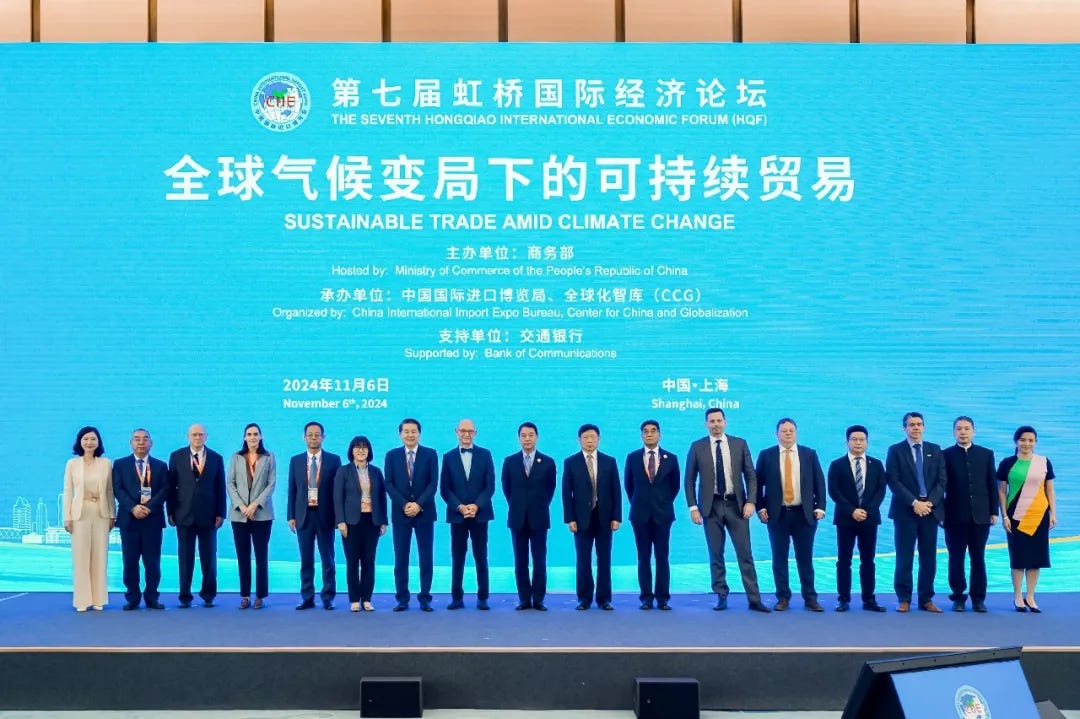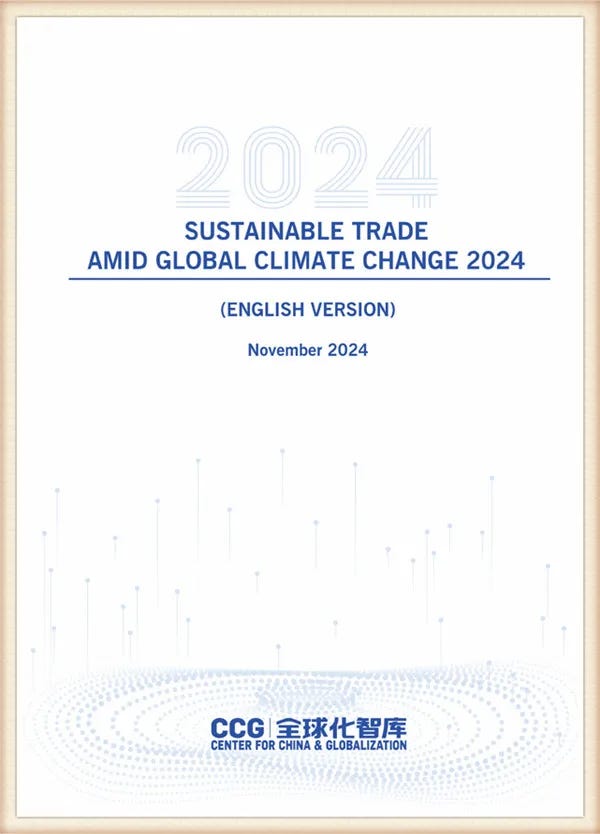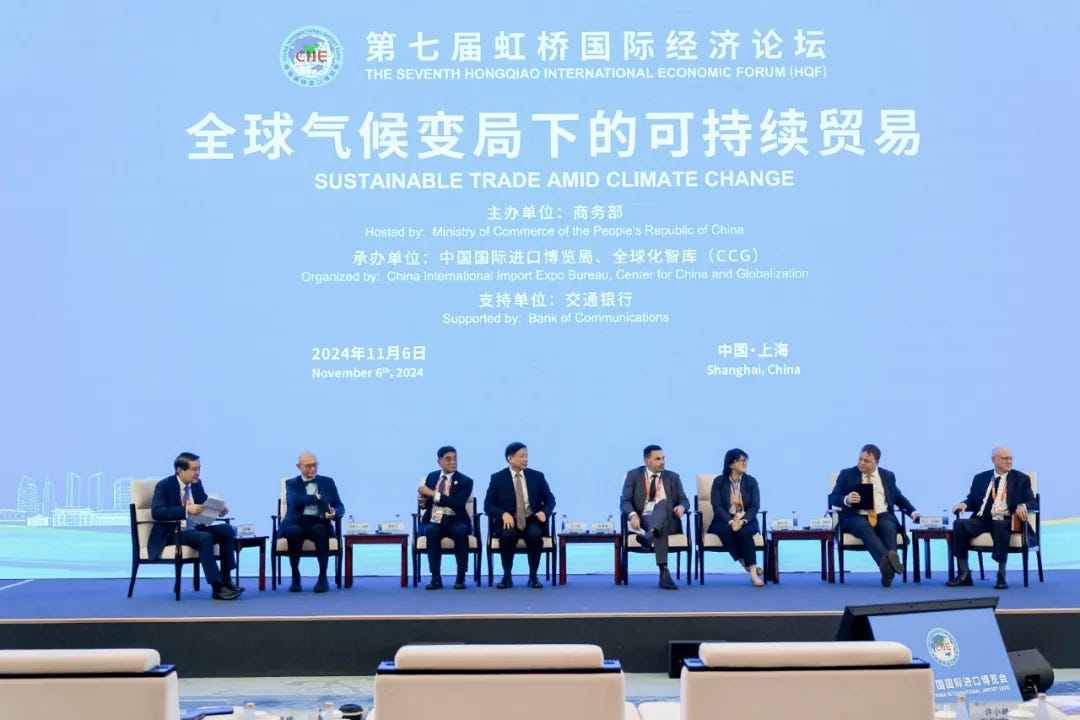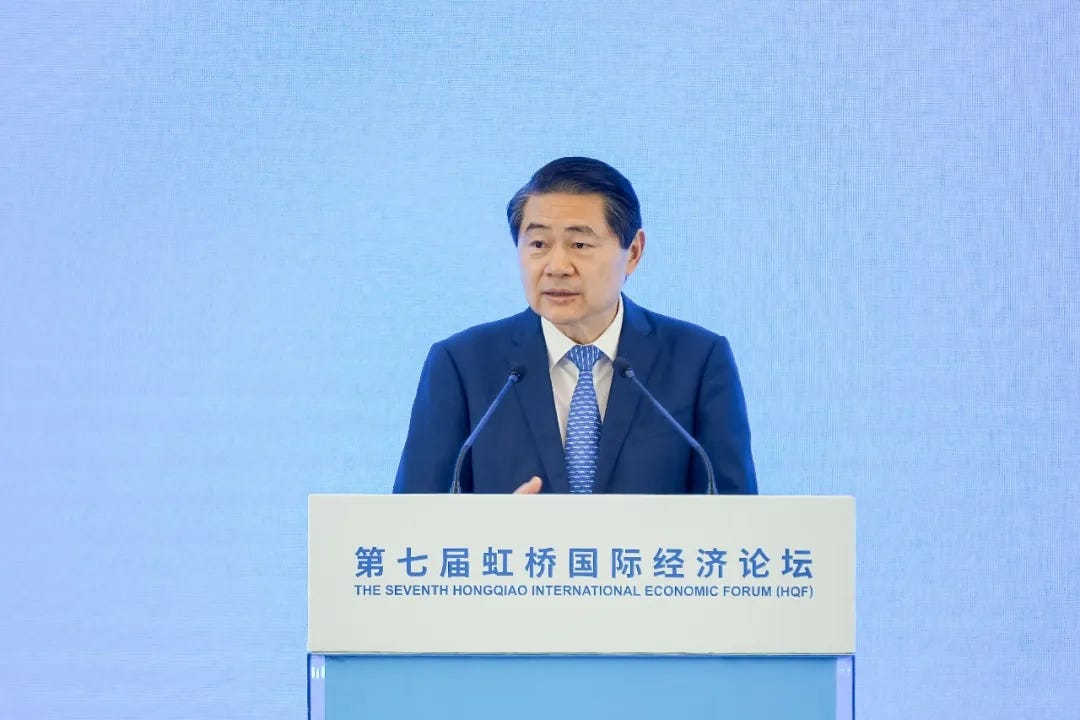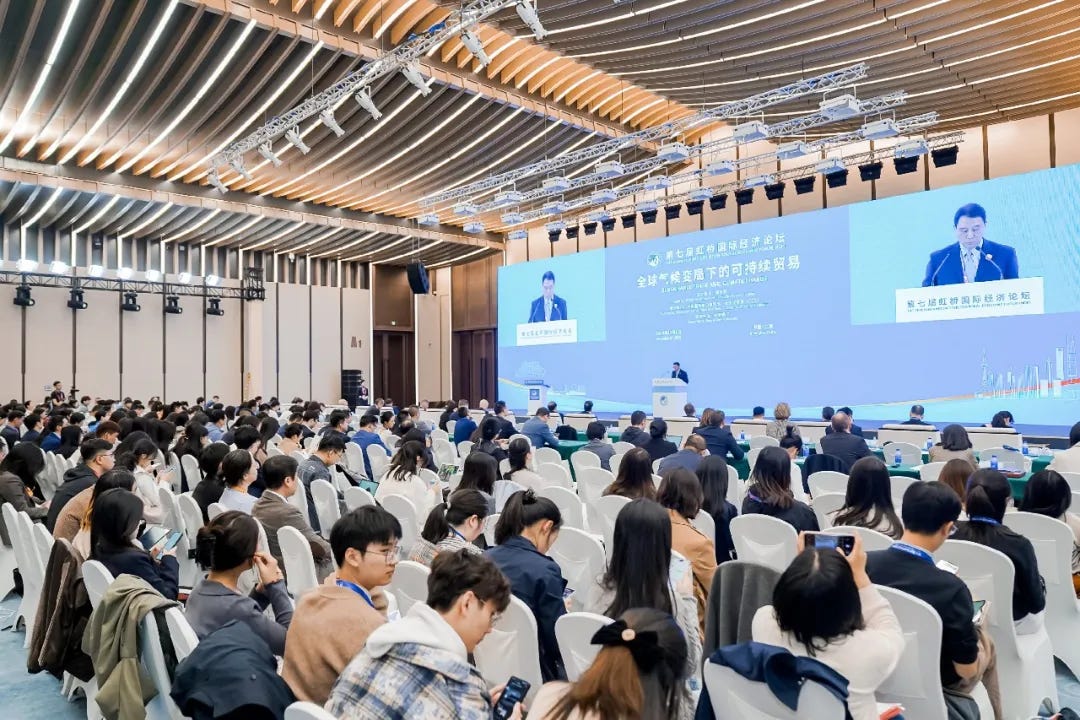CCG report: Sustainable Trade amid Global Climate Change 2024
Report released at the CCG-hosted sub-forum of the 7th China International Import Expo
On November 6, 2024, the sub-forum "Sustainable Trade amid Global Climate Change" of the 7th China International Import Expo and Hongqiao International Economic Forum was successfully held in Shanghai. The event was hosted by the Ministry of Commerce of the People's Republic of China and jointly organized by the China International Import Expo Bureau and the Center for China and Globalization (CCG).
During the sub-forum, CCG also released its report Sustainable Trade amid Global Climate Change 2024.
The sub-forum's video recording is available on YouTube, and the full PDF report can be downloaded here in this post and online.
Below are the key points of Sustainable Trade in a Changing Global Climate (2024):
Multiple challenges to the development of sustainable trade and protectionism hindering the development of new energy industries
The report shows that deglobalization has become a significant trend in the global economy in recent years. Deglobalization is characterized primarily by countries implementing policies to protect their domestic markets and reduce dependence on international markets. This trend is the result of several factors acting in concert, including the global financial crisis, geopolitical conflicts, and supply chain disruptions caused by the pandemic. Particularly after the outbreak of the COVID-19 pandemic, many countries recognized the vulnerability of relying too heavily on global supply chains and began taking measures to strengthen domestic manufacturing and reduce dependence on external resources. This reversal of globalization has directly driven the rise of trade protectionism, with countries introducing a range of policies to protect domestic industries, especially in sectors like renewable energy and technology-intensive sectors.
The renewable energy industry is highly globalized, relying heavily on international cooperation and resource sharing between countries. However, the rise of deglobalization and trade protectionism has had a significant impact on this sector. These effects are not only limited to supply chain disruptions and rising product costs but also extend to deeper changes in technological innovation and the competitive landscape of the industry.
The renewable energy sector, including solar power, wind energy, and EV industries, depends on highly integrated global supply chains. Core components and raw materials for these industries often require cross-border procurement. Many countries are strengthening their domestic supply chains and reducing reliance on external resources in response to the uncertainties brought by climate change. However, this approach conflicts with the principles of global trade liberalization. The tension between localization and globalization has created greater challenges for the international community in aligning climate change efforts with trade policies.
The rapid development of the renewable energy sector heavily relies on global technology exchange and cooperation. However, the implementation of trade protectionist policies has restricted technological exchange, particularly in areas such as R&D collaboration and technology transfer within the renewable energy field. To protect their leadership positions in technology, many countries have implemented strict restrictions on the export of key technologies. The restrictions on technology exchange and intellectual property disputes have slowed the pace of technological innovation in the renewable energy industry. Trade protectionism has not only impacted supply chains and technology flows but has also significantly reshaped the competitive landscape of the global renewable energy market.Research by the International Monetary Fund (IMF) has found that, over the past year, developed countries have introduced more industrial policies than developing countries to protect their domestic industries. This intensified competition has led the global renewable energy sector into a “subsidy race.”
The trend of localization in the renewable energy industry reflects the tension between self-sufficiency and global cooperation. Many countries are attempting to protect their domestic renewable energy sectors through localization policies, which, while potentially boosting domestic green economic growth in the short term, also exacerbate unfair competition in global trade and weaken incentives for international cooperation. In developed countries such as the United States and the European Union, governments are encouraging localized production in the renewable energy sector, attempting to attract more renewable energy companies to move their production lines domestically through policy measures such as government subsidies and tariffs. However, the widespread implementation of these localization policies has weakened the momentum of global cooperation. Against the backdrop of localization policies and protectionist measures implemented by various countries, the global renewable energy market is becoming increasingly fragmented, with significantly fewer opportunities for international cooperation.
The trend of deglobalization and protectionism has severely tested international cooperation in sustainable trade. The WTO, as the primary body for establishing and coordinating global trade rules, has seen its role significantly weakened. In response, countries are increasingly turning to regional cooperation and bilateral agreements to address trade and climate change issues, but these efforts have failed to create a unified force.
In recent years, the effectiveness and authority of the WTO have been increasingly undermined, particularly in addressing emerging fields such as climate change and the renewable energy industry. The current WTO rules have become outdated and insufficient to meet the demands of these new challenges. In recent years, the U.S. has notably undermined the WTO’s functioning, particularly during the Trump administration. The dysfunction of the WTO, evident in the paralysis of its dispute resolution mechanism, also reflects the overall decline of multilateralism. As globalization is increasingly questioned and trade protectionism rises, more countries are opting for unilateral actions or regional trade agreements to safeguard their national interests. This trend is particularly pronounced in the renewable energy and technology-intensive industries.
As multilateral mechanisms like the WTO weaken, an increasing number of countries are turning to regional cooperation to address global climate change and trade issues. Regional trade agreements not only fill the gap left by multilateral mechanisms but also serve as key platforms for international trade and climate cooperation. However, these regional cooperation mechanisms also face the challenge of balancing trade liberalization with climate change policies.
Recommendations:
Ten ways to lead towards a greener, sustainable, and low-carbon international trade system
In the context of addressing climate change and achieving sustainable development, international trade policies are gradually transitioning toward green and low-carbon models. CCG President Henry Huiyao Wang emphasizes that maximizing green production capacity is crucial for combating climate change. Rather than resorting to protectionism, the focus should be on fostering cooperation among all stakeholders. Governments, businesses, and international organizations should work together to develop and implement sustainable trade policies, promoting the global circulation of green products and technologies to achieve a win-win situation for economic growth and environmental protection. Below are the recommended measures:
I. Formulate Sustainable Trade Policies and Optimize the Structure of Green Products
Sovereign nations should develop trade policies from the perspective of sustainable development, encouraging the export of sustainable products while restricting the export of raw materials with high energy consumption and high emissions. This will help optimize the global structure of green products and services trade.
By leveraging regional industrial advantages and strengths in green development, countries should accelerate the transformation towards green energy, promote the application of green technologies, and encourage businesses to prioritize low-carbon, energy-efficient, environmentally friendly, and green materials and technologies in their design and manufacturing. This will enhance the competitiveness of green product exports.
Governments should support the trade of technologies, equipment, key components, and raw materials in green supply chains, increase the trade of environmentally friendly, renewable energy, and other low-carbon products, and promote the trade of green consumer goods. In addition, active engagement in the trade of energy-saving technologies, low-carbon technologies, green designs, environmental services, and other knowledge-intensive, eco-friendly services should be encouraged.
II. Deepen Multilateral, Bilateral, and Regional Cooperation
Countries should collectively uphold the international system with the United Nations at its core, and work towards the full implementation of the United Nations Framework Convention on Climate Change (UNFCCC) and the Paris Agreement. Countries should actively advocate for the inclusion of sustainable trade as a cross-cutting issue linked to existing investment, production, and consumption in the UN Sustainable Development Goals (SDGs) policy framework. The WTO, as a platform, can be leveraged to foster global governance consensus, update rules, and promote the establishment of a new sustainable trade mechanism. This would involve improving the institutional framework supporting sustainable trade and exploring the creation of a sustainable trade evaluation system. Countries should also promote policies that encourage sustainable trade, use multilateral negotiations to reduce or even exempt tariffs on sustainable products, and offer trade facilitation measures for their customs clearance. These actions will help promote the development of global sustainable trade.
III. Cooperation and Coordination Among Major Global Economies
Major global economies, such as China, the United States, and the European Union, should move beyond the geopolitical narratives surrounding sustainable trade and collaborate on sustainable trade policies. This would help balance the global supply of green products and reduce the use of unilateral trade protectionist measures. Effective coordination of their trade policies through global platforms and organizations (such as the WTO, G20, and UNFCCC) will allow these economies to minimize the use of unilateral sanctions and protectionist policies. China, the U.S., and the EU could reach a consensus on lowering tariffs on sustainable products, reducing non-tariff barriers, and establishing unified green product standards. Additionally, encouraging greater cooperation and technology transfer in the green economy sector among other countries and making joint efforts to promote carbon footprint standards and green certification systems would ensure the sustainability of traded products.
IV. Advancing Low-Carbon Regulations and Strengthening International Cooperation
Countries should strengthen international cooperation and advance low-carbon regulations within major global institutions. In 2012, APEC members reached the world's first substantive agreement on a list of environmental products aimed at promoting trade liberalization in such products, covering 54 customs tariff codes. In 2021, the IMF recommended that the world’s major carbon-emitting countries increase carbon prices under the G20 framework in consideration of development stages and historical emissions responsibilities, and establish a carbon price floor. The OECD has long emphasized the importance of carbon pricing, identifying it as the most crucial policy tool to address climate change. Countries should effectively leverage existing multilateral collaboration platforms to promote policy coordination in sustainable trade and green finance, setting unified standards under an inclusive framework. Additionally, efforts should be made to enhance supply chain transparency and foster technological innovation cooperation.
V. Expanding Green Product Imports and Promoting Market Diversification
China should expand the import of sustainable products and diversify import markets to create opportunities for global sustainable trade. Actively increasing imports is a major initiative in China's efforts to further open its economy. China’s vast market and high-level opening up offer significant opportunities for the rapid development of global sustainable trade. With a population of over 1.4 billion and a middle-income group exceeding 400 million, expected to reach 800 million in the coming decades, the demand for green products in China is substantial, providing important growth opportunities for global low-carbon products. It is recommended to continue leveraging the China International Import Expo (CIIE) platform by hosting exhibitions focused on sustainable import, supporting the expansion of green product imports, and positioning China’s large market as a key driver of global sustainable trade opportunities.
VI. Strengthening International Cooperation in Green Industrial Chains
China should leverage sustainable trade to drive low-carbon development in upstream and downstream industries, as well as related sectors. International cooperation in green manufacturing should also be strengthened to promote the establishment of a cooperation system for green, low-carbon industrial and supply chains, ensuring the efficient integration of high-end resources with the real economy. Other measures include enhancing technical exchanges and cooperation, reducing the market entry costs for green products and technologies to accelerate their global adoption, and improving the top-down design for addressing climate change. Additionally, China can increase innovation efforts in energy-saving, environmental protection, clean production, and clean energy technologies, while promoting international scientific research cooperation and technical exchanges to achieve breakthroughs in green, low-carbon technological innovation.
VII. Deepening International Cooperation in Green Finance
China should promote practical cooperation in climate investment and financing, such as encouraging the development of green credit, green bonds, green insurance, and other financial products can provide financing support for energy conservation, environmental protection, clean production, clean energy, ecological environment, green infrastructure, green services, and other key areas. China should also improve mechanisms for international cooperation in green finance by enhancing alignment in assessment standards, environmental and governance information reporting, and disclosure, in addition to actively exploring and developing international green finance standards and strengthening global coordination within a standard green finance framework. It is recommended that China’s multilateral banks such as the Asian Infrastructure Investment Bank (AIIB) and the New Development Bank (NDB) provide credit services for sustainable trade, issue sustainable bonds, invest in carbon reduction initiatives and green economies in developing countries, and help underdeveloped economies establish carbon markets.
VIII. Promoting International Mutual Recognition of Green Product Certification and Labeling
China should advance certification of carbon labels for import and export goods across countries and promote the coordination and mutual recognition of carbon footprint methodologies for products such as batteries. International cooperation on green electricity certification should be strengthened to support the establishment of an international green electricity certificate system and explore international standards for green electricity certificate issuance, measurement, and trading. China is also recommended to actively promote the development of international technology and quality standards and regulations, continuously improve the international cooperation system for inspection, testing, and certification, and reinforce international cooperation on green standards.
IX. Promoting South-South Cooperation for Joint Development of Sustainable Trade
China is recommended to enhance South-South cooperation and actively encourage countries of the Global South to participate in sustainable trade development. In November 2023, China signed 48 South-South cooperation agreements on climate change with BRI partner countries. Designing and promoting sustainable trade construction plans within economic and trade cooperation zones along the BRI route is recommended to help address the needs of BRI countries in transforming traditional industries and upgrading energy infrastructure. China can increase the export of green technologies and green production capacities, using its experience to expand sustainable trade cooperation with BRI countries.
X. Strengthening Capacity Building for Sustainable Trade and Promoting Coordinated Development
China can enhance capacity building in sustainable trade by fostering collaboration and communication among key stakeholders, such as think tanks, professional associations in sustainable trade, relevant third-party service agencies, and regulatory bodies. Industry training can be conducted to continuously increase enterprises’ awareness and capacity for green, low-carbon development. Think tanks, government departments, industry associations, and specialized agencies should work together to establish a public consultation platform for sustainable trade services.




